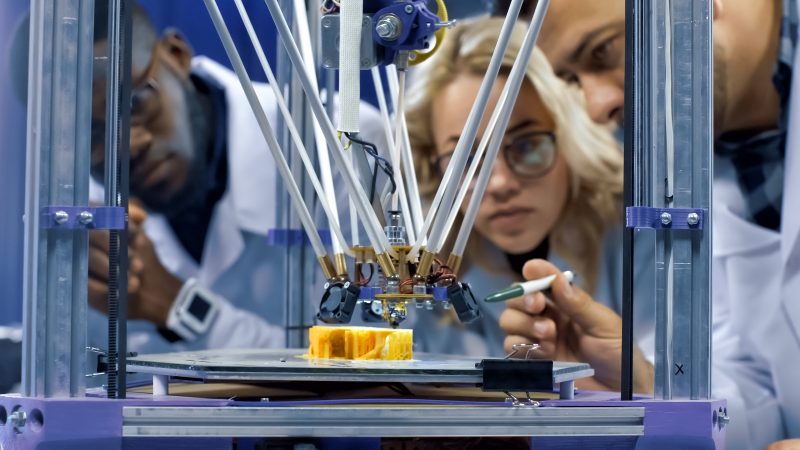Putting medical technologies at the heart of… Leave a comment

From robotic surgery and wearables to connected devices and AI-powered diagnostics, medical technologies are reinventing healthcare. Europe’s medtech sector is making unprecedented investments in research & innovation – and joining the Innovative Healthcare Initiative for the first time.
Patrick Boisseau is the Director General Strategic Initiatives of MedTech Europe.
Something big is happening in healthcare research. A tectonic shift in Europe’s health innovation ecosystem that began three years ago will be reflected in the EU Innovative Health Initiative’s (IHI) first call for proposals to be launched next month. A change that has taken place behind the scenes is ready to take the stage.
The IHI is a public-private partnership between the European Union and Europe’s life sciences industries. With a total budget of €2.4 billion until 2027, it is the biggest partnership of its kind. The initiative builds on the success of the Innovative Medicines Initiative (IMI) but with one key difference: the new IHI goes beyond medicines and is championed by both medical technology and pharmaceutical industries.
For the first time, the medical technology, biotechnology, digital health and vaccines industry will join the pharmaceutical sector, SMEs, healthcare professionals and academic researchers to assemble a bigger, broader team of innovation-driven partners.
This coalition has co-designed a Strategic Research & Innovation Agenda (SRIA) which sets out the key areas where collaborative projects can make a difference to the next generation of discoveries. It is a timely move, reflecting the need to drive innovation in Europe.
The medical technology industry has a lot to bring to the table. Our sector is large and diverse, providing a wide range of products and services. Looking to the future, MedTech Europe members have identified seven research and innovation priorities for coming years under IHI and beyond.
- Portable, wearable, smart devices: wearables and monitoring devices to facilitate personalised and convenient care at home; AI-powered devices and analytics to improve care processes in hospitals and the community.
- Antimicrobial resistance: tools and services that support the prevention and control of infection; diagnostics that guide antimicrobial treatment decisions; and tools that aid responses to emerging infectious diseases.
- Early diagnosis and treatment in oncology and neurology: earlier detection and specific treatment, through diagnostics and precision imaging; better diagnosis and management of chronic disease, including neurological conditions.
- Automated, robotic surgery: minimally invasive surgery to accelerate patient recovery and deliver efficiencies to hospitals; embracing automation and inventing the operating theatre of the future.
- Regulation and reimbursement: reimagining regulatory and reimbursement pathways to ensure innovation reaches citizens, patients and healthcare providers; tackling innovation funding gaps and unlocking the power of precision medicine.
- AI and data: harness the potential of big data; AI planning and advanced manufacturing to bring the benefits of the digital era to the healthcare system.
- Automated, decentralised in-vitro diagnostics (IVDs): creating the laboratory of the future to ensure efficiency; tapping into advances in digitalisation and the revolution in genomics and biomarkers; bringing diagnostic tests closer to the patient.
MedTech Europe’s vision is of the future where technology improves the lives of patients while helping health systems to meet the needs of citizens in a sustainable way. It fits well with the collaborative spirit of the IHI which encourages partners to take a long-term view and a cross sectorial approach to finding the solutions society needs.
A mindset shift
Engaging with the IHI is a new start for the medical technology sector. To be clear, medical technology companies are among the most innovative in the world. They file more European patents than any other industry; they have brought 500,000 products and services to market; and they employ more than 750,000 people in 33,000 companies – 95% of which are SMEs.
What’s new is the medical technology industry’s active participation in a large EU initiative. Some companies have worked on European research projects, but this has not been the norm.
The medical technology innovation model is different to that of the pharmaceutical industry. Medical technology companies have traditionally been less focused on early-stage research – preferring to leave this to start-ups and academia, and then coming on board later in the process to drive clinical validation, regulatory approval and market access.
This will continue, of course, but we are also on the cusp of something new. Never before has the medical technology industry collectively invested so heavily in a shared vision of research and innovation.
The change of mindset we are witnessing did not happen overnight – it is the result of a shift that began at least over the last three years, Companies began to explore areas where partnerships could save time and costs over the next five-to-10 years.. Companies have expressed not only an strong willingness to contribute to Europe-wide healthcare innovation, but also that the medical technology sector is evolving to meet this challenge.
A win-win for Europeans
We see major benefits to working with partners on problems that are simply too great to solve alone. There is the prospect of making meaningful breakthroughs and laying the foundation for future waves of innovation. And a chance for real progress on innovation bottlenecks from regulation to reimbursement. In addition, companies gain access to networks and expertise, as well as data and patients.
For Europe, there are clear advantages to supporting R&I, including making Europe more attractive in the global contest for investment and talent. The cross-sectoral innovation ecosystem to which the IHI will contribute is an opportunity to ensure that the ideas generated by European healthcare start-ups, academics and industry stay in Europe – ensuring the creation of wealth and jobs, while putting European patients first in line for life-changing new products and services.
Europe’s medical technology industry views this new era as a win-win for all European healthcare players. As the IHI adds fresh momentum to collaborative health R&I, we are ready to play our part in shaping the future.


